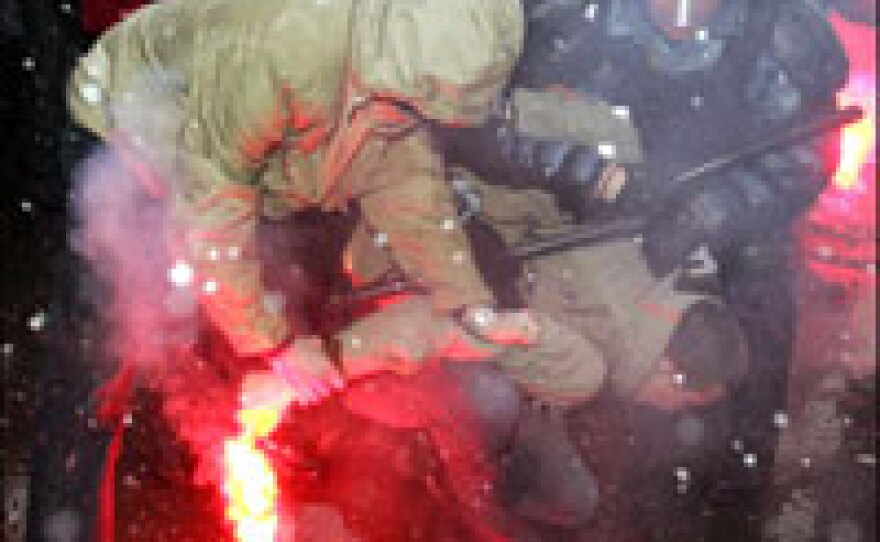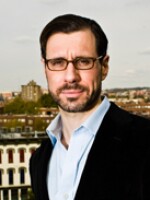



During his eight years in power, Russian President Vladimir Putin has overseen his country's dramatic transformation into an oil-rich power. But he has also brought back authoritarianism to Russia, where corruption is running rampant and many still live in poverty.
Putin's handpicked successor, Dmitri Medvedev, takes office on Wednesday. But that doesn't mean Putin is going away.
Taking Over
No one expected just how brilliant a politician Putin would be when Boris Yeltsin appointed him acting president. It was a last-ditch effort on Yeltin's part to install a loyal successor as he announced his resignation on New Year's Eve in 1999.
But just months earlier, as prime minister, Putin had launched a second war in Chechnya. That made the former KGB officer — who was previously little-known — so popular that he easily won the presidential election the following year.
As the country's steely new leader, Putin vowed to restore Russia as a great power, saying corrupt politicians and greedy businessmen were dragging the country down.
"That's why we're insisting on a single dictatorship in Russia," Putin said. "A dictatorship of the law." That became Putin's mantra. He said he would fight the country's massive corruption by building a powerful central government.
In Putin's first year as president, parliament became nothing more than a place for legislators to rubber-stamp his policies, while state-controlled companies began taking over independent media outlets. Police also investigated the country's powerful business oligarchs, some of whom fled abroad.
But while Putin claimed to be strengthening Russia, he was also consolidating his own power by attacking his rivals. In 2003, police arrested Mikhail Khodorkovsky, Russia's richest man. His Yukos oil company was sold to a state-controlled company, and Khodorkovsky landed in a Siberian prison, convicted of fraud and tax evasion. Many believe his real sin was to have challenged the Kremlin.
Soon after, Putin used tragedy to his political advantage.
Consolidating Power
Shots and explosions rang out in Beslan in 2004 as terrified children, their parents and teachers tried to escape from a school where Chechen rebels had held more than 1,000 people hostage. Putin had refused to negotiate, and witnesses say many of the more than 330 people who died were killed by soldiers firing into the building during the botched rescue attempt.
After the massacre, Putin told his grieving country that Moscow's enemies wanted to split Russia apart.
"We were weak," he said. "And the weak are beaten."
His response was to abolish elections of the country's regional governors in favor of presidential appointments.
Putin replaced many of those governors and others in government with his fellow former KGB officers. The president's allies now run the country's biggest oil and gas companies and other state enterprises, swallowing up ever-larger sectors of the economy.
Putin claims credit for having saved Russia from splitting apart. But Stanford University professor Michael McFaul says the idea that Putin has brought stability and prosperity to Russia is a myth.
"Russia's return or Russia's economic growth under Putin has as much to do with world oil prices and economic reforms of the '90s as it does with anything that Mr. Putin himself did," McFaul says.
Corruption is flourishing in Russia. Moscow's streets crawl with Bentley and Mercedes cars plying between lavish luxury shops and restaurants, even as people flee the poverty-stricken countryside. Alcoholism and other diseases have grown under Putin, while violence from Chechnya is spreading to other parts of the volatile Caucasus region.
And once again in Russia, criticism of the Kremlin has become a crime. The sight of riot police in central Moscow beating peaceful protesters is common these days, such as in March, when people demonstrated against the results of the presidential election, which opposition leaders say was rigged.
The victor in that election, Medvedev, is taking over as president, but Putin won't disappear. He will stay in power as prime minister and head of the majority party in parliament — a decision some say has sealed the final demise of Russian democracy.
Resurrecting a Soviet-style, one-party state, Putin's critics say, will be his biggest legacy.
Copyright 2022 NPR. To see more, visit https://www.npr.org. 9(MDAzMjM2NDYzMDEyMzc1Njk5NjAxNzY3OQ001))







